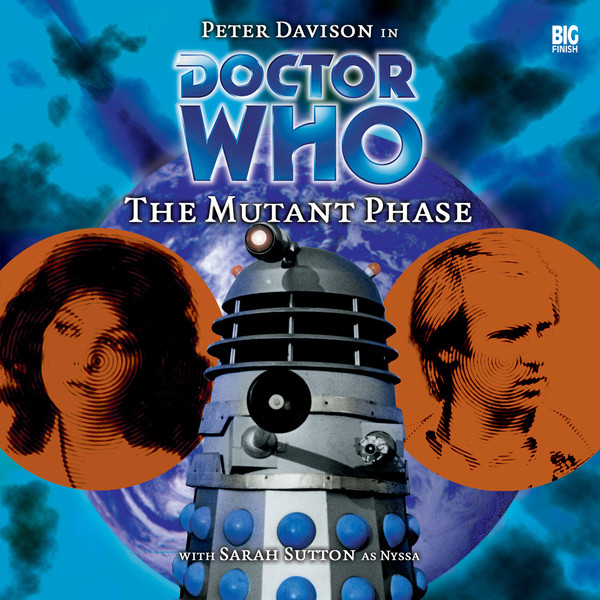
Released December 2000
‘The Mutant Phase’ is the third story to pit the Daleks against the Doctor. Whereas ‘The Genocide Machine’ had the novelty of being the first and ‘The Apocalypse Element’ had the novelty of being set on Gallifrey, ‘The Mutant Phase’ has no such device to bolster excitement and so the story has to stand solely on its own merit as the Daleks this time face the Fifth Doctor and Nyssa. Unfortunately, despite many very positive attributes to the tale that make it quite enjoyable to listen to, there are quite a few noticeable flaws as well, some more debatable than others.
The biggest issue with ‘The Mutant Phase’ is that it all comes down to a paradox, albeit not one necessarily consciously created. This is a common science fiction trope, and sometimes it can be effective in retrospect, but it becomes quite obvious early on that the plot is headed in this direction, giving a sense of nonchalant detachedness to the proceedings since they will ultimately be inconsequential. This is most egregious in the second episode when the Doctor and Nyssa arrive on Earth in the forty-third century and find the last stragglers of human civilization being pursued by both Daleks and Thals. Of the three humans present in these scenes, Albert and Dolores are given nothing truly meaningful to do and have no lasting significance in the story. Karl- who is superbly played by Mark Gatiss- fares little better, and even though he is importantly tasked with introducing the mutants, all of this is done in much more depth and detail later on in the story as well. Of all of the events of that episode, the only truly meaningful scenes are those involving the Daleks and the Thals as the Thals confront the moral implications facing them as they affiliate with their age-old foes. This concept is revisited later in the story as well, though.
The central premise for the story is an intriguing one, showing what the Daleks fear. Having wasps cause a mutation in the Daleks is a bold idea, and a topical one to some extent, and everything translates quite well to audio. The resultant threat is portrayed as a powerful and randomly chaotic force; while the result is undeniable as the Daleks are never ones to show fear or weakness, it seems like there could have been more potential had the mutants been just as individually ruthless and cunning as their non-mutated precursors. The one absolute positive, though, is that Nicholas Briggs absolutely knows how to write the Daleks. Although they’ve begrudgingly teamed up with the Doctor before, Briggs perfectly captures the rampant xenophobia, and their spite towards the Doctor and the Thals is almost tangible and material. It’s quite clear that the Daleks are only going along with the alliance for as long as necessary and still will not hesitate to kill anyone and anything at the soonest convenient moment. There are also quite a few nods to Dalek continuity without being unbearable, and seeing the Dalek (and Robomen) presence somewhere other than Britain is a fantastic touch that adds some scope to the current and previous adventures.
With no Davros present, it really is the Emperor Dalek who takes control and shines, and it’s clear that he is dictating the Daleks’ actions. The Emperor has always been a great foil for the Doctor, mostly because he provides one unique focus for his unbridled hatred of the Daleks whereas Davros was slightly disconnected from the proper Dalek threat. Here the Emperor is portrayed as a being who will stop at nothing to stop the mutant phase, even destroying Skaro in the process. His taking control of Ganatus toward the end, however, is when events become more personal as he and the Doctor work together and deceive each other as each sees fit, driven together only by the compulsion of the situation. The controlled Ganatus has no compunction in saying the Doctor can be killed and portrays a sense of incredulity quite well as he has to repeat himself to his Commander to prove that he is still the Emperor. Of course, though, the Emperor gets into events too deeply and, by traveling back in time to stop the mutant phase ends up causing it himself, a self-fulfilling prophecy of sorts.
Peter Davison and Sarah Sutton as the Doctor and Nyssa, respectively, both do very good work in this story. Nyssa, in particular, definitely benefits from being the only companion. Although she serves the necessary role of being the one to whom the Doctor must explain everything for the audience’s benefit, she also gets plenty of chances to show off her scientific knowledge and to just interact with the Doctor in a way that the crowded TARDIS on screen never allowed her. Big Finish has gone a long way in humanising the character, and it will be interesting to see that development continue in the future. Davison, likewise, superbly portrays the Doctor’s hatred of the Daleks in all circumstances even as he needs to both help them and ask for their help in turn. It’s very fitting for this incarnation- and potentially with major ramifications going forward- that he first attempts to cure the mutant phase before agreeing to the Emperor’s plan to go back in time to prevent it altogether.
There really is a lot to enjoy about ‘The Mutant Phase,’ and it ends up being a solid Dalek tale for Davison. Unfortunately, the paradoxical nature of the ending- telegraphed quite early on- takes away any lasting emotional impact from the unique and frightening core concept.
- Release Date: 12/2000


Leave a Reply